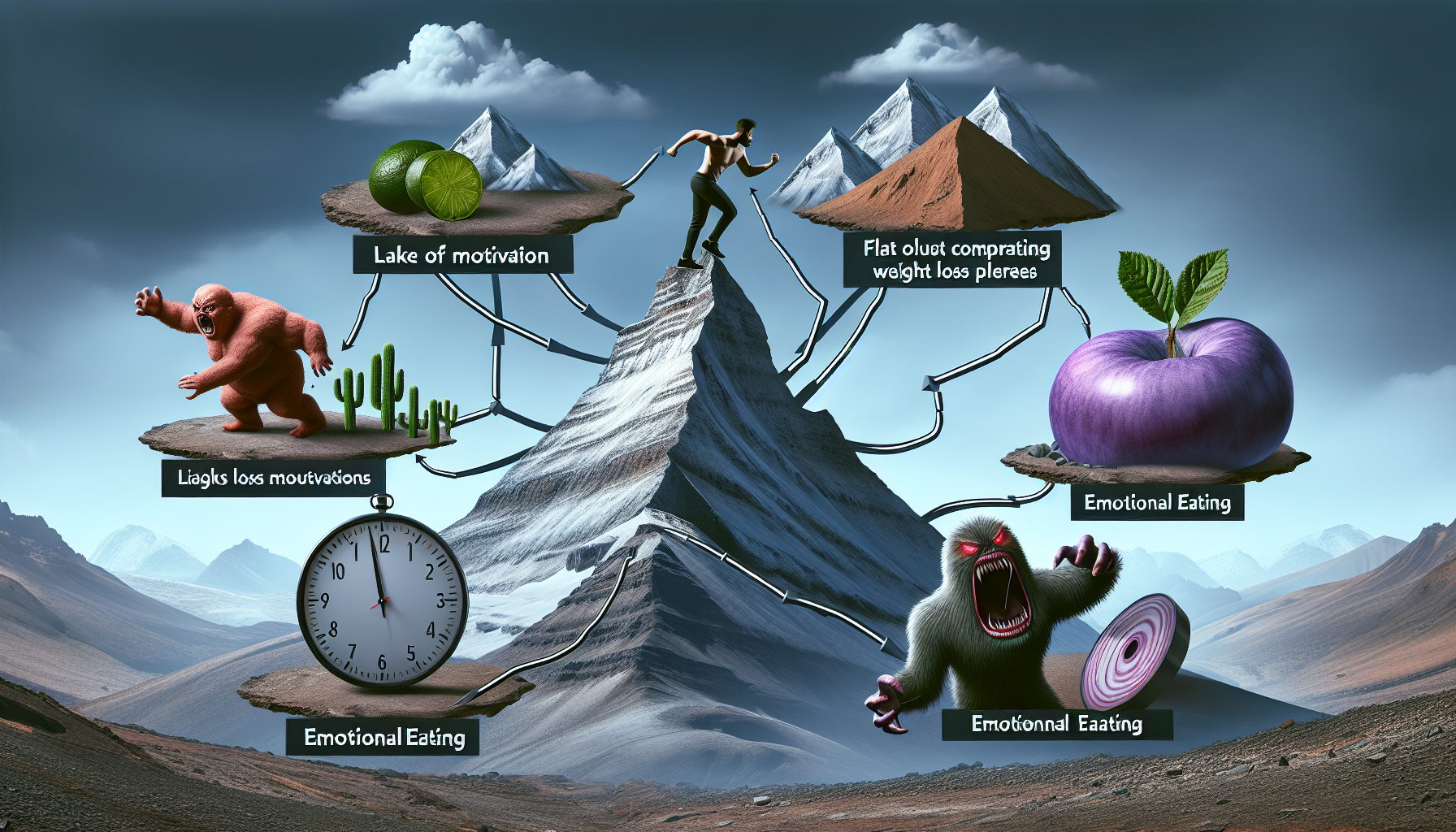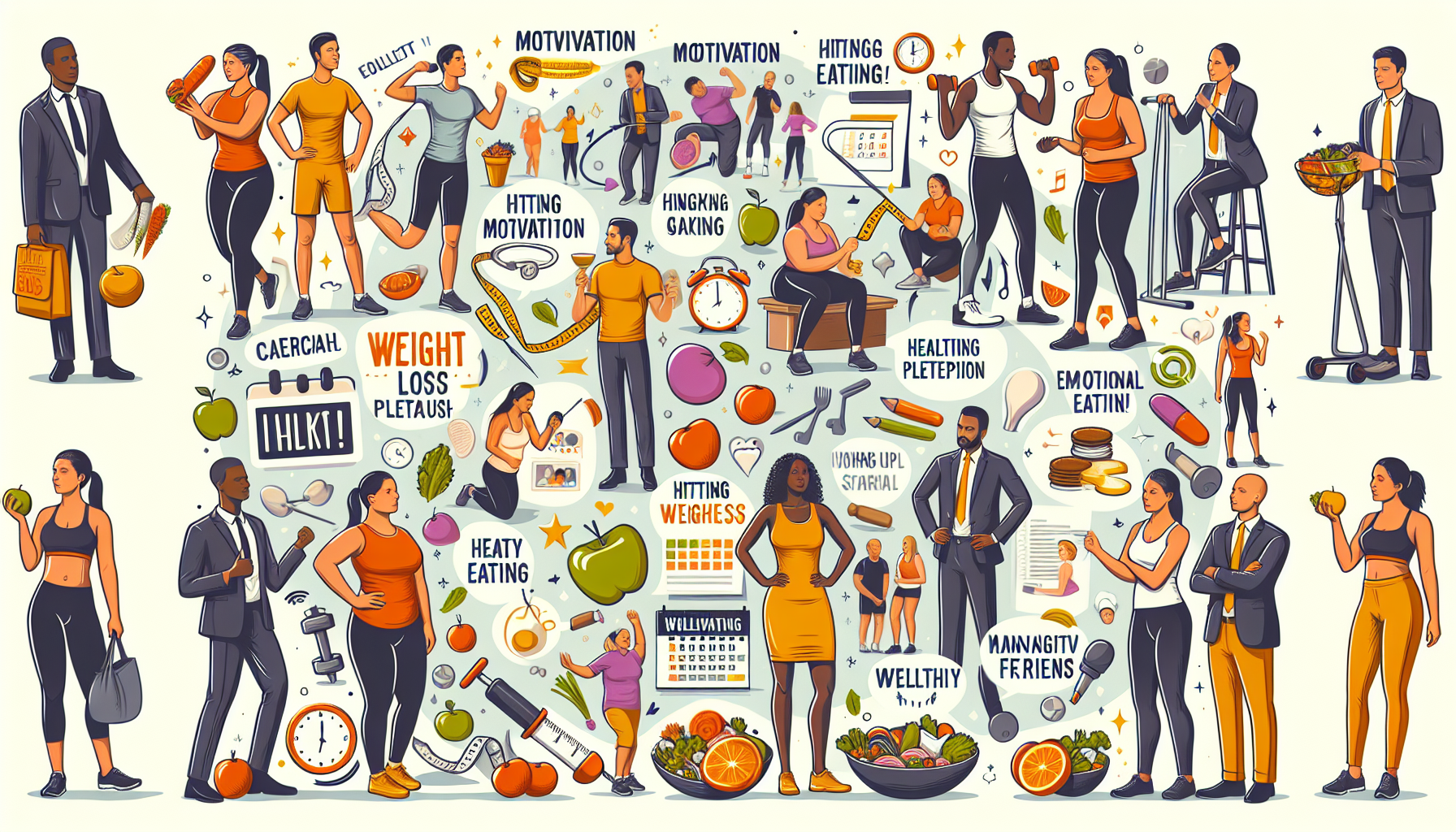Losing weight can be a tough journey, filled with various challenges along the way. From battling cravings to struggling with motivation, there are plenty of hurdles to overcome. However, don’t let these obstacles discourage you! In this article, we will explore some common weight loss challenges and provide practical tips to help you conquer them. Remember, though, that it’s always essential to consult with a health professional before making any significant changes to your diet or exercise routine. With the right approach and a positive mindset, you can overcome these challenges and achieve your weight loss goals.
Discover the Ultimate Weight Loss Secrets Here!
Setting Realistic Goals
Understanding the Importance of Realistic Goals
When embarking on a weight loss journey, it is essential to set realistic goals. Setting goals that are too ambitious or unrealistic can lead to disappointment and frustration, ultimately derailing your progress. Realistic goals, on the other hand, provide a clear and achievable path to success.
Realistic goals are important because they help to maintain motivation and prevent burnout. When you set achievable goals for yourself, you are more likely to stay committed and continue making progress. Celebrating small victories along the way can also boost your confidence and keep you motivated.
Setting SMART Goals
One effective way to set realistic goals is by using the SMART method. SMART stands for Specific, Measurable, Attainable, Relevant, and Time-bound. By applying these criteria to your goals, you can ensure that they are realistic and well-defined.
Specific goals provide clarity and help you focus on what you want to achieve. For example, instead of saying “I want to lose weight,” a specific goal would be “I want to lose 10 pounds in three months.”
Measurable goals allow you to track your progress and determine whether you are on the right track. For example, tracking your weight loss progress weekly or measuring your waistline can provide concrete evidence of your achievements.
Attainable goals are within your reach and take into account your current abilities and resources. It is important to set goals that challenge you, but are still realistic and attainable. For example, setting a goal to lose 2 pounds per week is more realistic than aiming to lose 10 pounds per week.
Relevant goals are aligned with your overall weight loss objectives and are meaningful to you. Consider why you want to achieve a certain goal and how it fits into your larger weight loss journey. This will help you stay motivated and focused.
Time-bound goals have a clear deadline, which provides a sense of urgency and helps to prevent procrastination. Setting a timeframe for achieving your goals can provide structure and keep you accountable.
Breaking Down Long-Term Goals into Short-Term Goals
Long-term goals can be overwhelming, so it is important to break them down into manageable short-term goals. Breaking your larger goals into smaller, actionable steps can make them feel less daunting and more achievable.
For example, if your long-term goal is to lose 50 pounds in six months, you can break it down into smaller monthly or weekly goals. This allows you to focus on one small step at a time and track your progress more effectively.
By setting short-term goals, you can stay motivated and maintain momentum in your weight loss journey. Celebrate each small achievement along the way and use it as motivation to keep pushing forward.
Tracking Progress and Celebrating Milestones
Tracking your progress is crucial for staying on track and identifying areas for improvement. Find a method that works for you, whether it’s using a weight loss app, keeping a journal, or taking regular measurements. Regularly assessing your progress can help you stay accountable and make adjustments when necessary.
In addition to tracking your progress, it is essential to celebrate milestones along the way. Acknowledging and rewarding yourself for achieving your goals can provide a sense of accomplishment and further motivate you to continue your weight loss journey.
Whether it’s treating yourself to a small indulgence, enjoying a spa day, or simply giving yourself a pat on the back, taking the time to celebrate your milestones is an important part of staying motivated.
Managing Emotional Eating
Recognizing Emotional Triggers
Emotional eating, also known as stress eating, can be a significant obstacle to successful weight loss. It is important to recognize the emotional triggers that lead to overeating and develop strategies to manage them effectively.
Common emotional triggers include stress, boredom, sadness, loneliness, and anxiety. By being aware of these triggers, you can better understand your eating patterns and make positive changes.
Developing Healthy Coping Mechanisms
Instead of turning to food for comfort, it is essential to develop healthy coping mechanisms to manage emotions. Find activities that help you relax and reduce stress, such as practicing mindfulness, engaging in physical activity, or pursuing a hobby.
Experiment with different coping mechanisms and find what works best for you. It may take time to find healthier alternatives to emotional eating, but with persistence and determination, you can develop new habits that support your weight loss goals.
Creating a Support System
Having a strong support system can make a world of difference when it comes to managing emotional eating. Surround yourself with family, friends, or a support group who understand and encourage your weight loss journey.
Share your struggles and successes with them, and lean on them for support when you are feeling overwhelmed. Having someone to talk to can provide perspective and help you gain control over emotional eating.
Seeking Professional Help If Needed
If emotional eating becomes a persistent problem or significantly affects your weight loss efforts, it may be beneficial to seek professional help. A therapist or counselor can provide valuable guidance and support in developing healthier coping mechanisms and managing emotions.
They can help you identify underlying emotional issues and provide strategies to overcome them. Remember, seeking help is not a sign of weakness but a proactive step towards a healthier lifestyle.

Click Here for Proven Fat-Burning Strategies!
Dealing with Plateaus
Understanding Plateaus in Weight Loss
Plateaus are a common occurrence in weight loss journeys and can be frustrating and demotivating. Understanding why plateaus happen can help you navigate through them and continue making progress.
Plateaus occur when your body adapts to your current weight loss efforts and reaches a state of equilibrium. This means that your body requires fewer calories to function, resulting in a slowdown or pause in weight loss.
Reevaluating Caloric Intake
When faced with a plateau, it may be necessary to reevaluate your caloric intake. As your body adjusts to your weight loss efforts, it may require fewer calories than before. Reassess your daily calorie intake and consider reducing it slightly to kickstart your weight loss again.
Keep in mind that drastic calorie reductions are not recommended, as they can have negative effects on your metabolism and overall health. Consult with a registered dietitian to determine the appropriate caloric intake for your individual needs.
Adding Variety to Workouts
Another way to overcome plateaus is by adding variety to your workouts. Your body can become accustomed to the same exercise routine, leading to diminished results. Incorporate different types of workouts, such as strength training, cardio, and flexibility exercises, to challenge your body in new ways.
Changing up your exercise routine not only stimulates different muscle groups but also keeps you mentally engaged and motivated. Consider trying new fitness classes, exploring outdoor activities, or incorporating high-intensity interval training (HIIT) into your workouts.
Mixing up Exercise Routines
In addition to adding variety to your workouts, it is important to mix up your exercise routines. Varying the intensity, duration, and type of exercises can help prevent plateaus and continue challenging your body.
Consider incorporating interval training, where you alternate between high-intensity bursts of exercise and lower-intensity recovery periods. This can help increase your calorie burn and boost your metabolism.
Including strength training exercises is also beneficial for overcoming plateaus. Building lean muscle mass can increase your metabolic rate and help you burn more calories even at rest.
Handling Food Cravings
Understanding the Cause of Food Cravings
Food cravings are often triggered by a combination of physiological and psychological factors. Understanding the root cause of your cravings can help you manage them effectively and make healthier choices.
Physiological cravings can be a result of imbalances in hormones or nutrient deficiencies. For example, a craving for chocolate may be a sign of a magnesium deficiency. By ensuring you have a well-balanced diet and meeting your nutritional needs, you can reduce the intensity of cravings.
Psychological cravings, on the other hand, are often driven by emotions, habits, or the environment. These cravings are not based on nutritional needs but rather a desire for comfort or pleasure. By recognizing and addressing the underlying emotions or triggers behind your cravings, you can develop healthier responses.
Practicing Mindful Eating
Mindful eating is a powerful tool for managing food cravings. It involves paying attention to the sensory experiences and physical sensations of eating, such as the taste, texture, and smell of food.
By practicing mindful eating, you can become more attuned to your body’s hunger and fullness cues. This can help you differentiate between true hunger and emotional cravings. You can also savor each bite and fully enjoy your food, which can reduce the likelihood of overeating.
Finding Healthy Substitutes
Instead of completely denying yourself of your favorite treats, find healthy substitutes that can satisfy your cravings without derailing your weight loss efforts. For example, if you are craving something sweet, opt for a piece of fruit or a small portion of dark chocolate.
Experiment with healthy recipes that recreate your favorite indulgent foods, using nutritious ingredients. By finding healthier alternatives, you can satisfy your cravings without compromising your progress.
Distracting Yourself with Other Activities
When a craving hits, distracting yourself with other activities can help take your mind off food. Engage in a hobby, read a book, go for a walk, or call a friend. By redirecting your attention and focusing on something else, you can ride out the craving until it passes.
It is important to note that occasional indulgence is part of a balanced approach to eating. If you satisfy your cravings in moderation and continue to prioritize healthier choices overall, a few treats here and there will not derail your progress.

Unlock Your Path to a Healthier You!
Staying Motivated
Setting and Reviewing Goals Regularly
To stay motivated throughout your weight loss journey, it is important to set goals and review them regularly. Set both short-term and long-term goals that are specific, measurable, attainable, relevant, and time-bound (SMART).
Writing down your goals and placing them somewhere visible, such as on your refrigerator or bathroom mirror, can serve as a constant reminder and motivation to stay on track. Regularly review your goals to assess your progress and make any necessary adjustments.
Finding an Accountability Partner
Having an accountability partner can greatly enhance your motivation and commitment to your weight loss goals. Find someone who shares your desire to live a healthier lifestyle and who can provide support and encouragement.
Share your goals and progress with your accountability partner, and hold each other accountable for staying on track. Check in with each other regularly and celebrate milestones together. Knowing that someone is counting on you can provide an extra push to keep going.
Rewarding Yourself for Achievements
Rewarding yourself for achieving milestones is an important part of staying motivated. Celebrate your successes, whether big or small, with non-food rewards that align with your weight loss goals.
Treat yourself to a massage, buy a new workout outfit, or enjoy a day at the spa. Choose rewards that are meaningful to you and reinforce your commitment to a healthy lifestyle.
Trying New Forms of Exercise
To keep your motivation high, try incorporating new forms of exercise into your routine. Explore different fitness classes, outdoor activities, or sports that you haven’t tried before.
When you engage in activities that you enjoy, you are more likely to stay motivated and committed. Trying new forms of exercise can also challenge your body in different ways, prevent boredom, and boost your overall fitness level.
Overcoming Social Pressures
Communicating Your Weight Loss Goals
When faced with social pressures related to food choices and lifestyle, clear communication about your weight loss goals is key. Let your friends, family, and colleagues know about your journey and explain why it is important to you.
By sharing your goals with others, you can gain their understanding and support. They may be more likely to accommodate your needs during social gatherings and offer encouragement along the way.
Bringing Your Own Healthy Food to Social Events
When attending social events where unhealthy food options are plentiful, it can be challenging to stick to your weight loss goals. One strategy is to bring your own healthy dish or snack to share. This ensures that you have a nutritious option available and reduces the temptation to indulge in unhealthy choices.
You can also offer to host gatherings, allowing you to have more control over the menu. Prepare a variety of healthier options that everyone can enjoy, demonstrating that healthy eating can be delicious and enjoyable.
Choosing Healthier Options at Restaurants
Eating out at restaurants can present a variety of tempting food choices. However, you can still make healthier choices while dining out.
Look for menu options that are grilled, baked, or steamed rather than fried. Choose dishes that incorporate plenty of vegetables and ask for dressings or sauces on the side. Opt for water or unsweetened beverages instead of sugary drinks.
Remember that moderation is key. Enjoy your meal, savor each bite, and listen to your body’s cues of fullness.
Finding Supportive and Like-Minded Individuals
Surrounding yourself with supportive and like-minded individuals can make a significant difference in overcoming social pressures. Seek out groups or communities that share similar weight loss goals or healthy lifestyle aspirations.
Joining a weight loss support group or participating in fitness classes can provide a sense of belonging and motivation. Sharing experiences, tips, and challenges with others who understand can be invaluable on your journey.

Managing Stress
Understanding the Connection between Stress and Weight Loss
Stress can have a significant impact on weight loss efforts. When we are stressed, our bodies release cortisol, a stress hormone that can increase appetite and lead to weight gain, particularly in the abdominal area.
Stress can also lead to emotional eating, as we often turn to food for comfort during stressful times. It is important to address and manage stress effectively to support your weight loss goals.
Incorporating Stress-Reducing Activities into Daily Routine
Incorporating stress-reducing activities into your daily routine can help minimize its impact on your weight loss journey. Find activities that help you relax and unwind, such as yoga, meditation, deep breathing exercises, or taking a bath.
Identify activities that bring you joy and make them a priority in your schedule. Engaging in activities that you enjoy can significantly reduce stress levels and help you stay focused on your weight loss goals.
Practicing Relaxation Techniques
Practicing relaxation techniques can be an effective way to manage stress and prevent emotional eating. Techniques such as deep breathing, progressive muscle relaxation, and guided imagery can help calm your mind and reduce stress levels.
Incorporate these techniques into your daily routine, especially during high-stress periods. By intentionally taking time to relax and unwind, you can prevent stress from sabotaging your weight loss efforts.
Seeking Professional Help If Needed
If stress becomes overwhelming or significantly impacts your ability to manage your weight loss journey, it may be beneficial to seek professional help. A therapist or counselor can provide guidance and support in managing stress and developing effective coping mechanisms.
They can help you uncover the root causes of stress, better understand your triggers, and provide strategies for managing stress in a healthy way. Remember that seeking help is a sign of strength and is crucial in maintaining your overall well-being.
Maintaining a Healthy Lifestyle
Creating Sustainable Eating Habits
One of the keys to long-term success is creating sustainable eating habits. It is important to focus on nourishing your body with a well-balanced diet rather than resorting to extreme or restrictive measures.
Include a variety of fruits, vegetables, lean proteins, whole grains, and healthy fats in your meals. Avoid strict diets that eliminate entire food groups, as they are often difficult to maintain and may lead to nutrient deficiencies.
Developing a healthy relationship with food is crucial for sustainable weight loss. Listen to your body’s hunger and fullness cues, eat mindfully, and savor each bite. By prioritizing balance and moderation, you can enjoy a wide range of foods while still making progress towards your weight loss goals.
Finding Enjoyable Forms of Exercise
Finding enjoyable forms of exercise is essential for maintaining a healthy lifestyle. Engage in activities that you genuinely enjoy, as you are more likely to stick with them in the long run.
Try different types of exercises, such as dancing, swimming, hiking, or playing a sport. Explore fitness classes or online workouts that align with your interests and fitness level.
By finding pleasure in physical activity, you can turn exercise into a regular habit rather than a chore. This will help you maintain your weight loss and overall well-being.
Prioritizing Sleep
Adequate sleep is crucial for weight management and overall health. Lack of sleep can disrupt hunger and satiety hormones, leading to increased cravings and decreased energy levels.
Make sleep a priority by establishing a consistent sleep schedule and creating a relaxing bedtime routine. Aim for 7-9 hours of quality sleep each night to support your weight loss efforts.
Staying Hydrated
Drinking enough water is often overlooked but is essential for maintaining a healthy lifestyle. Staying hydrated can help control cravings, boost metabolism, and support your body’s natural detoxification processes.
Carry a water bottle with you throughout the day to remind yourself to drink water regularly. If plain water becomes boring, try infusing it with fruits or herbs to add flavor.
Avoid sugary drinks and opt for water as your primary beverage. By staying hydrated, you can support your weight loss goals and overall well-being.

Avoiding Extreme Diets
Understanding the Risks of Extreme Diets
Extreme diets that promise rapid weight loss can be tempting, but they often come with significant risks. These diets typically restrict certain food groups, severely limit calories, or rely on meal replacement products. Although they may result in short-term weight loss, they are difficult to sustain and may have negative long-term effects.
Extreme diets can lead to nutrient deficiencies, muscle loss, slowed metabolism, and a preoccupation with food. Additionally, once the diet is over, many individuals regain the weight they lost and often end up weighing more than before.
Focusing on Balanced and Nutritious Meals
Instead of resorting to extreme diets, focus on balanced and nutritious meals. A well-balanced diet is sustainable and provides your body with the necessary nutrients to support weight loss and overall health.
Include a variety of fruits, vegetables, whole grains, lean proteins, and healthy fats in your meals. Prioritize nutrient-dense foods that provide essential vitamins, minerals, and antioxidants.
Avoid restrictive eating patterns and aim for moderation. Allow yourself to enjoy occasional treats without guilt, incorporating them into a balanced approach to eating.
Listening to Your Body’s Hunger and Fullness Cues
One of the keys to maintaining a healthy weight is learning to listen to your body’s hunger and fullness cues. Avoid mindless eating and pay attention to your body’s natural signals.
Eat when you are physically hungry and stop eating when you are comfortably satisfied. Avoid eating out of boredom, stress, or as a coping mechanism. By tuning in to your body, you can nourish it appropriately and support your weight loss goals.
Seeking Guidance from a Registered Dietitian
If you are unsure about how to create a healthy and sustainable eating plan, consider seeking guidance from a registered dietitian. They are trained to provide individualized advice and can help you develop a balanced meal plan that supports your weight loss goals.
A registered dietitian can assess your nutritional needs, help you overcome challenges, and address any concerns or questions you may have. They can provide education on portion sizes, meal timing, and the importance of a well-rounded diet.
Note on Consulting Health Professional
Importance of Professional Guidance
While this article provides strategies for overcoming common weight loss challenges, it is crucial to consult a health professional before making any changes to your diet or exercise routine. Every individual is unique, and personalized guidance can help ensure your safety and effectiveness in achieving your weight loss goals.
Customizing Weight Loss Strategies
A health professional, such as a registered dietitian or a healthcare provider, can provide customized weight loss strategies tailored specifically to your needs. They can consider your medical history, current health conditions, and individual preferences to develop a plan that is safe and effective for you.
Ensuring Safety and Effectiveness
Weight loss should always prioritize safety and long-term effectiveness. A health professional can guide you in making informed decisions that support your overall health and well-being. They can monitor your progress, assess your dietary and exercise habits, and make adjustments when necessary.
Medical Considerations and Personalized Advice
Certain medical conditions or medications may have an impact on your weight loss journey. A health professional can provide personalized advice based on your specific situation and offer guidance on how to navigate any potential challenges.
Consulting a health professional is especially important if you have any underlying health conditions, are on medications, or have specific dietary restrictions. They can help you develop a plan that takes into account your unique circumstances and ensures your safety.
In conclusion, overcoming common weight loss challenges requires a combination of mindset, strategies, and professional guidance. By setting realistic goals, managing emotional eating, dealing with plateaus, handling food cravings, staying motivated, overcoming social pressures, managing stress, maintaining a healthy lifestyle, avoiding extreme diets, and consulting a health professional, you can navigate through your weight loss journey successfully. Remember, everyone’s journey is different, so be patient and kind to yourself as you work toward your goals.

